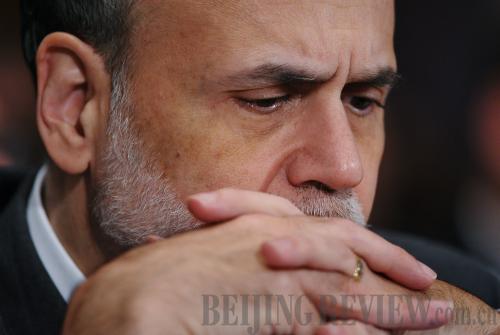|
 |
|
NO PANACEA: Ben Bernanke, Fed Chairman, has stressed the limitations of monetary policy to jump-start the lagging U.S. economy (XINHUA/AFP) |
The longer the Fed intervenes in the credit markets and distorts the price of loanable funds, the greater will be the adjustment costs later on. Postponing hard choices while running the printing presses—to monetize government debt—creates moral hazard and a too-big-to-fail mentality.
Bernanke is rightly concerned about the inability of the Congress to cut the size and scope of government, but his own actions have allowed government to grow and constrained the private sector, which has always been the engine for real growth.
Beginning students in economics learn that printing money is not a magic wand that creates wealth. If it were, Zimbabwe would be rich. Institutional changes that expand the range of choices open to individuals, a rule of law that protects persons and property, freedom of contract that allows for mutually beneficial trade, and a sound currency are the key ingredients for economic progress and human happiness.
The United States lectures China while violating the very principles it preaches. The financial crisis has increased government intervention and decreased economic freedom. QE3 would do more of the same. The Fed's power has been increased far beyond what Congress intended. There is no monetary rule to ensure stable money; there is insufficient transparency; and the Fed is now seen as a supporter of excessive government and specific asset prices (notably, bonds and stocks).
The volatility in the U.S. stock market reflects policy uncertainty. Investors expect the Fed to support the stock market and to bailout large financial institutions. A recent article in The Wall Street Journal was appropriately titled, Market Bets on Fed Miracle. Such an attitude is a far cry from rugged individualism and market liberalism.
Today, there is no link between the dollar and gold. The world is on a pure fiat money system, in which currency has value only because a government says it does, and the United States, as the core reserve country, holds the key to monetary stability. But the Fed has chosen a regime of discretion rather than rules, of monetary uncertainty rather than stability.
People expect too much from the Fed. Bernanke has fostered that expectation by buying up toxic assets, supporting government bond prices, and continuing the "Greenspan put"—that is, jumping in with ultra-low interest rates and using quantitative easing to increase stock prices, with the hope that when people feel richer they will spend more and create jobs. But those policies have not worked. There is no free lunch.
What the Fed needs is a dose of humility—a clear recognition that there are limits to monetary policy and to the knowledge officials can acquire about a complex economic system. A central bank can never duplicate the spontaneous order created under a self-adjusting system like the classical gold standard. Under a true gold standard, the supply of money is determined by market forces, not by government, and it adjusts to the demand for money. Such a system safeguards the long-run value of money, limits the power of government, and ensures fiscal responsibility.
The dollar needs an anchor. Without convertibility and without a monetary rule, the dollar is adrift in a sea of uncertainty. QE2 does nothing to correct that problem. Some economists are calling for inflation of 4-5 percent to stimulate the economy. Others are calling for taxing currency to give people an incentive to spend now. Some, however, are calling for fundamental reform and an end to discretionary government fiat money.
Those who favor fundamental reform should recall the words of James Madison, the chief architect of the U.S. Constitution. In 1831, he wrote, "The only adequate guarantee for the uniform and stable value of a paper currency is its convertibility into specie, the least fluctuating and the only universal currency."
Fed under pressure
The U.S. presidential election next year will be a referendum on the size and scope of government, including the power of the Fed. Voters and foreign holders of U.S. debt deserve a serious debate, not more political posturing. The United States faces significant fiscal imbalances and a depreciating currency. Taking a principled approach to policy is essential for the future of freedom and prosperity.
In the meantime, the Fed may decide to engage in QE3. That would be a mistake. Eventually, interest rates have to rise—and bond prices fall. China and other large holders of U.S. debt will be penalized, more so as the dollar weakens.
The Fed's dual mandate requires that both price stability and full employment be achieved. The problem is that the Fed is limited: It cannot permanently affect real variables. Increasing base money to spur job growth has not worked. If the Fed abolishes interest on excess reserves, those reserves could be lent out. That would increase nominal income but have little impact on long-run growth. If inflation expectations increase, interest rates would quickly rise and stagflation set in.
The challenge will be for the Fed to revert to a credible policy of long-run price stability and prevent wide swings in nominal income. But as long as fiscal policy drives monetary policy, and the Fed tries to allocate credit, both monetary and fiscal policy will fail. Congress needs to reconsider the dual mandate and recognize the limits of monetary policy. The stage will then be set for real reform.
The author is vice president for academic affairs and a China analyst with the Cato Institute in Washington, D.C. | 